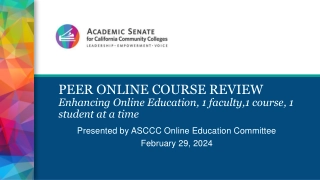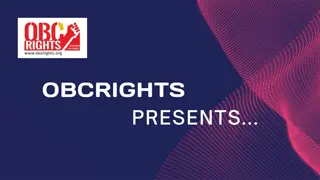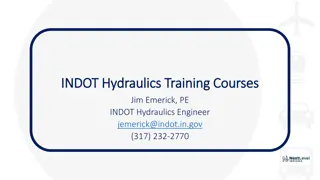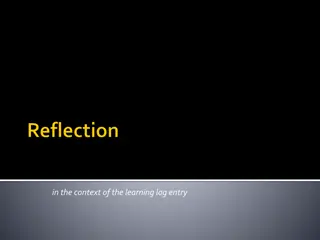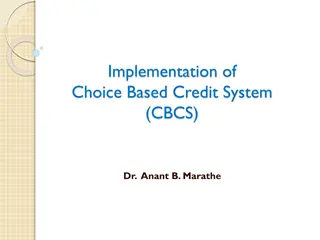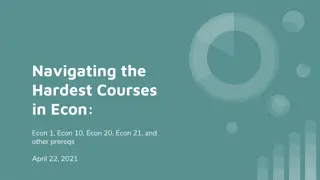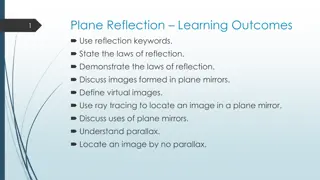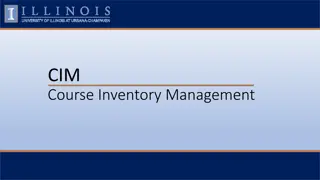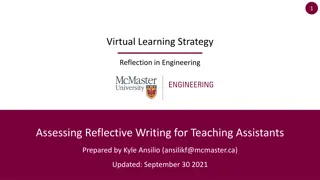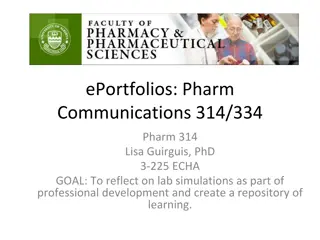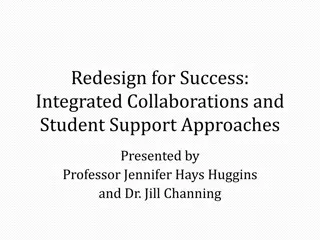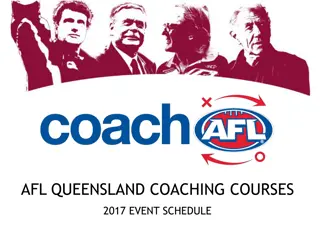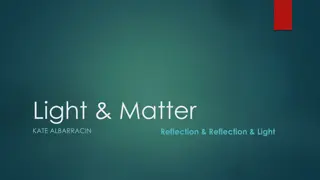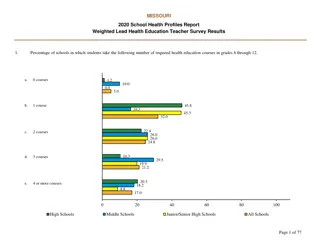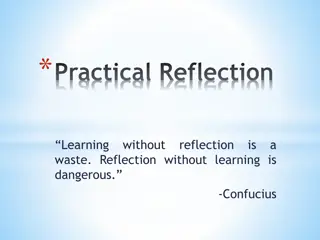Enhancing Online Courses Through Reflection: Dr. Jill Channing's Insights
Explore the significance of integrating reflection into online courses with Dr. Jill Channing's expert guidance. Discover how reflection boosts metacognition, improves learning outcomes, and enhances teaching strategies, all within a social learning framework that focuses on interactions and connections. Reflect on the value of experiences, problem-solving skills, and the importance of adapting in online education.
Download Presentation

Please find below an Image/Link to download the presentation.
The content on the website is provided AS IS for your information and personal use only. It may not be sold, licensed, or shared on other websites without obtaining consent from the author.If you encounter any issues during the download, it is possible that the publisher has removed the file from their server.
You are allowed to download the files provided on this website for personal or commercial use, subject to the condition that they are used lawfully. All files are the property of their respective owners.
The content on the website is provided AS IS for your information and personal use only. It may not be sold, licensed, or shared on other websites without obtaining consent from the author.
E N D
Presentation Transcript
Integrating Reflection Into Online Courses Dr. Jill Channing
Session Objectives As a result of attending this session, participants will 1. describe the purposes and uses of reflections for teaching and learning in online courses. 2. analyze strategies for creating periodic teaching and learning reflections in online courses. 3. determine appropriate timing for reflection in their online course contexts. 4. develop or adapt a reflection assignment or activity for their online course(s).
Problem Nilson and Goodson (2018) argue that online course design needs to move beyond a pedagogy focusing on the bells and whistles of technology as tools. Our reflection on what counts should highlight what will have enduring value for our students, not just list some course objectives that focus on values and attitudes (chap. 2, para. 4).
Metacognition and Reflection Metacognitive practices increase students abilities to transfer or adapt their learning to new contexts and tasks (Bransford et al., 2000; Palincsar & Brown, 1984; Scardamalia et al., 1984; Schoenfeld, 1983, 1985, 1991). If people lack the skills to produce correct answers, they are also cursed with an inability to know when their answers, or anyone else s, are right or wrong (Dunning et al., 2003, p. 85).
Why Reflect? Importance of metacognition Adjust and adapt teaching strategies Act as models Adjust and adapt as learners Notice mistakes Learn to correct own errors (independence) Recognition of the importance of experience Meaning of experiences Increase problem solving Create a sense of renewal/closure
Theoretical Framework Social theories of learning highlight the importance of interactions and connections to course material, instructors, peers, and the program itself and underpin this presentation s theoretical grounding.
Theoretical Framework Palloff and Pratt s (2013) and Stavredes (2011) conceptualizations of effective online teaching and learning encourage integration of reflections into collaborative, content-based, periodic course reflections.
Current Practices How are you currently integrating reflection in your online courses? How do you think about timing reflections?
Timing of Reflection How might timing influence reflection? When would be the most critical times to reflect and why?
Strategies for Integrating Reflection Mid-course feedback Final course reflection Assignment/test de-briefing Student planning/goal-setting Student and faculty relationships and sharing (i.e. letters)
Grit Assessment Reflection Duckworth s grit test Reflection on score Thinking about one s learning Reflecting on one s perseverance Strategizing to improve one s grit
Beginning of the Course Reflection Reflect on one s current knowledge What do you know? What do you need to know? How do you learn best? How would you teach this course?
Mid-course Reflection and Feedback Reflecting on learning motivation/work habits instruction (suggestions for improvements for the remainder of the course) course materials (i.e. readings)
Final Course Reflections Reflection on work habits what worked/didn t work for students learning what they would do if they had more time argue for a grade based on performance
Assignment/Test Reflection Students reflect on the process of a completing an assignment. Setting goals and timelines Students reflect on performances. what they would do if they had more time what they did to prepare for the test time they spent on the assignment/studying what grade they believe they deserve based on performance
Faculty and Student Relationships Reflective Journals select significant learnings envision how they could apply these learnings to future situations commit to an action plan to consciously modify their behaviors.
Faculty and Student Relationships Dear Jill Letters chance to write about anything develop relationships with instructor instructor write back to students connect throughout the semester
Song Reflection Students choose a song to reflect on learning in the course Quote from the song to discuss learning Discuss reflections with peers (discussion board)
Implications for Practice Think through timing of reflection Thinking about thinking (meta-cognition) Self-assessment Model practices
Choose Your Own Adventure! Develop your own reflective lesson/assignment Objectives for reflection Timing considerations
Develop Reflective Activity Have an outcome in mind (i.e. leadership, team building, improved critical thinking, acknowledgment) Be appropriate for the class (age, culture, etc.) Directly link to a project or experience. Vary for types of learning, interests, etc. Actively involve students for a really compelling reflection session Be facilitated well for maximum participation, creativity, and learning
Conclusion Ensure that students are fully engaged in the process of making meaning. Students create, not just consume, knowledge. Learning engages and transforms the mind (metacognition). Reflective students and teachers can collectively learn from all their experiences online via written and oral assignments.
Questions? Dr. Jill Channing Channing@etsu.edu
References Bransford, J. D., Brown A. L., & Cocking R. R. (2000). How people learn: Brain, mind, experience, and school. Washington, D.C.: National Academy Press. Dunning, D., Johnson, K., Ehrlinger, J., & Kruger, J. (2003) Why people fail to recognize their own incompetence. Current Directions in Psychological Science, 12(3). 83-87. Nilson, L. B. & Goodson, L. A. (2018). Online teaching at its best: Merging instructional design with teaching and learning research. San Fransisco, CA: Jossey-Bass. Palincsar, A. S., & Brown, A. L. (1984). Reciprocal teaching of comprehension-fostering and comprehension-monitoring activities. Cognition and Instruction, 1(2). 117-175. Pallof, R. M., & Pratt, K. (2013). Lessons from the virtual classroom: The realities of online teaching. San Francisco: Jossey Bass. Scardamalia, M., Bereiter, C., & Steinbach, R. (1984). Teachability of reflective processes in written composition. Cognitive Science, 8, 173-190. Schoenfeld, A. H. (1991). On mathematics as sense making: An informal attack on the fortunate divorce of formal and informal mathematics. In James F. Voss, David N. Perkins, and Judith W. Segal (Eds.), Informal reasoning and education (pp. 311-344). Hillsdale, NJ: Erlbaum. Stavredes, T. (2011). Effective online teaching: Foundations and strategies for student success. San Francisco, CA: John Wiley.



